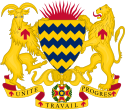| |||||||||||||||||||||||||||||||||||||||||||||||||||||||||||||||||||||||||||||||||||||||||||||||||
All 188 seats in the National Assembly 95 seats needed for a majority | |||||||||||||||||||||||||||||||||||||||||||||||||||||||||||||||||||||||||||||||||||||||||||||||||
This lists parties that won seats. See the complete results below. | |||||||||||||||||||||||||||||||||||||||||||||||||||||||||||||||||||||||||||||||||||||||||||||||||
 |
|---|
|
|
Parliamentary elections were held in Chad on Sunday, 13 February 2011, the first since 2002.[1] The elections were originally scheduled for 28 November 2010, but were postponed following a meeting in September between the ruling party and opposition leaders. According to the National Independent Electoral Commission (CENI), this was due to timing constraints caused by complications encountered during electoral preparations.[2]
The administration of President Idriss Déby had been in power since 1990,[1] and his party, the Patriotic Salvation Movement (MPS), had won nearly three-quarters of seats in the 2002 elections, but the results were condemned by observers as flawed.[1][3] Since 1990, the results of Chad's elections have been consistently disputed by opposition parties and civil organisations.[3][2] This year's elections were the result of an accord signed by the ruling party and its opponents in August 2007, under the auspices of the European Union, to foster democracy in the war-torn country.[3] However, international observers and opposition leaders stated prior to the elections that another victory for the MPS was most likely.[1]
The elections saw the MPS-led coalition retain its majority in the National Assembly, winning 134 of the 188 seats. Presidential elections were subsequently held on 25 April 2011, which saw Déby re-elected.[1][2]
- ^ a b c d e Deutsche Presse-Agentur (13 February 2011). "Opposition to contest Chad's parliamentary elections". Monsters and Critics.com. WotR, Ltd. Archived from the original on 2013-01-03. Retrieved 2011-02-13.
- ^ a b c Agence France Presse (25 September 2010). "Chad electoral commission pushes back votes". Google News. Archived from the original on January 24, 2013. Retrieved 2011-02-13.
- ^ a b c Staff writers (13 February 2011). "Chad opp to contest polls after nine year absence". Daily Times. Retrieved 2011-02-13.